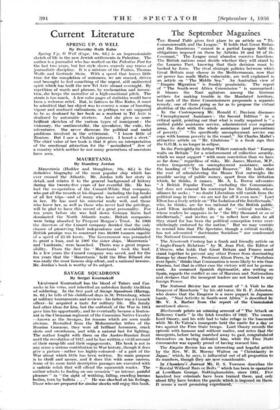The September Magazines es
THE Round Table gives first place to an article on " The Commonwealth and the League." It holds that Great Britain
and the Dominions " cannot in a partial League fulfil the obligations imposed on them by Articles 10 and 16 of the. Covenant." The League must abandon coercive functions.
The British nations must decide whether they will stand by the Locarno Pact, knowing that their decision must be backed by force. The rival strategic policies between which Great Britain may choose in the Mediterranean, now that air power has made Malta vulnerable, are well explained in an article on " The Middle Sea." An Australian view of " Empire Migration " is frankly pessimistic. The report of " The South-west Africa Commission " is summarised ; it blames the Nazi agitators among the German settlers for making trouble in the Mandated territory, but each of the three Commissioners propounds a separate remedy, one of them going so far as to propose the virtual abolition of the elected Council.
In the Contemporary Mr. Ronald C. Davison discusses " Unemployment Assistance : the Second Edition " in a critical spirit, pointing out that what is really required is " a unified public assistance service, administered over regional areas, to deal with the whole assistance (and prevention) of poverty." " No specifically unemployment service can cope with human poverty in the round." Sir Charles Mallet's attractive article on " Mr. Gladstone " is a fresh sign that the G.O.M. is no longer in eclipse.
In the Fortnightly Sir Arthur Willert contends that " Europe waits on Britain " for a reinforcement of collective- security, which we must support " with more conviction than we have so far done," regardless of risks. Mr. James Maxton, M.P., writes temperately on unemployment assistance, under the heading of " The Industrial Re:serve." He holds that the cost of administering the Means Test outweighs the possible saving of public money, apart from the irritation which, he thinks, it causes. Mr. A. L. Rowse advocates " A British Popular Front," excluding the Communists, but does not conceal his contempt for the Liberals whose alliance he seeks ; " no doubt Liberalism will vanish from the political map in time—we are not far off it even now." Lord Elton has a lively article on "The Isolation of the Intellectuals," who, he thinks, are far too rational for the British public.
Lord Elton incidentally tilts at the " critical weeklies," whose readers he supposes to be " the fifty thousand or so of intellectuals," and invites us " to reflect how alien to all
they stand for has been the political conception twice over- whelmingly endorsed by the nation." But we may venture
to remind him that The Spectator, though a critical weekly, has not advocated " doctrinaire Socialism " nor condemned the National GovernMent.
The Nineteenth Century has a frank and friendly article on " Anglo-French Relations " by M. Jean Piot, the Editor of L'Oeuvre, who holds that Great Britain and -France must stand together to prevent any other Power from dominating Europe by sheer force. Professor Alison Peers, in " Pendulvm over Spain," thinks that Communism is more likely to win than Fascism, but that in either case the victory will not be penile; neat. An unnamed Spanish diplomatist, also writing on Spain, regards the conflict as one of Marxism and Nationalism and declares that the insurgent leaders are not bound to any foreign Power.
- The National Review has an account of " A Visit to the Emperor of Manchuria " by his old tutor, Sir R. F. Johnston, who denies that the Emperor is a- mere- puppet in- Japanese hands. "Nazi Activity in South-west Africa" is described by 'Mr. V. A. Barber from the' report of the =Coisiinisillosi mentioned above.. - Black-woods prints an wringing account of " The Attack on Kilkenny Castle " in the Irish troubles of 1922: The owner, Lord Ossory, and his wife had to take refuge in the basement while Mr. De Valera's insurgents held the castle for a day or two against the Free State troops. Lord OSsory records the episode with humour and without malice, and notes that the insurgents, before being marched away to gaol, congratulated themselves on having defended him, while the Free State commander was equally proud of having rescued him.
The Empire Review has an interesting and hopeful article by the Rev. W. H. Murray Walton on " Christianity in Japan," which, he says, is influential out of all proportion to its nmiffiers, though they are now considerable. In' Chons6eryr's Journal: Mi. B: S. Townroe describes the " Horital Without Bars or Bolts " which has been in operation at Lowdham Grange, Nottinghamshire, since 1931. Five hundred boy criminals have been trained there, and only about fifty have broken the parole which is_imposed on them. It Seinis ii-moit promising






































 Previous page
Previous page